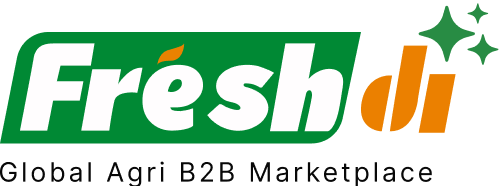Introduction – Current State of Play: The Cashew Nut Sector in Germany
Germany’s cashew nut market is at a fascinating crossroads. Amid global trade shifts, regulatory scrutiny, and changing consumer habits, businesses in the cashew supply chain are navigating a complex landscape. Recent years have seen surges in demand for healthy snacks, significant fluctuations in global supply chains, and the rise of sustainability as a core procurement criterion.
In 2023, Germany imported about 67,794 metric tons of cashew nuts—marking a 13% year-over-year growth. That makes the country the second-largest importer by value and third-largest by volume globally. But while demand is booming, the market is far from stable. Climate disruptions, EU regulations, and global tariff tensions are making it more important than ever for companies to stay nimble, informed, and strategic.
Smart sourcing and real-time intelligence are no longer optional—they’re essential. Platforms like Freshdi help buyers decipher these fast-moving developments by offering real-time supplier verification, RFQ trends, and market insights tailored to the cashew nut industry.
Let’s dive into what’s shaping Germany’s cashew market—and how to find reliable suppliers in such a dynamic environment.
Deep Dive – Market Movers: Recent Developments and Consequences
The German cashew sector is being reshaped by several key forces. These aren’t just minor ripples—they’re waves that impact sourcing strategies, pricing, and supplier relationships.
Health-Conscious Consumption Is Fueling Demand
Germans are snacking smarter. More people are reaching for cashews instead of chips. Why? Cashews are rich in iron and vitamin K, beneficial for immunity and bone health. Supermarkets and health shops are capitalizing on this by heavily marketing cashews as a guilt-free snack.
Seasonal Peaks Impact Supply Planning
Cashew sales spike during the winter holidays. Think cozy treats, gift baskets, and festive recipes. But in summer, demand dips. This seasonal shift means businesses must plan their imports and inventories with precision.
Rise of Vegan and Plant-Based Diets
Germany is a European leader in plant-based eating. Cashews—used in vegan cheeses, sauces, and desserts—are essential ingredients in this movement. This dietary trend is contributing to sustained demand throughout the year.
Supply Chain Dynamics: Germany’s Import-Heavy Model
Germany doesn’t grow cashews. Nearly all its supply is imported, primarily from:
- Vietnam
- India
- Côte d’Ivoire
- Burkina Faso
- The Netherlands
Germany also serves as a major re-export hub. Roughly 38% of imported cashews are re-exported—mostly to France, Poland, Luxembourg, and the UK. These international movements mean German suppliers need airtight logistics, traceability, and compliance systems.
Investments and Innovations: A Shift Toward Sustainability
In September 2024, Germany teamed up with the EU and Cambodia for a $27 million project to boost sustainable cashew exports. This five-year plan emphasizes:
- Local value addition
- Climate-resilient farming
- Green processing tech
- Ethical labor practices
This initiative reflects Germany’s increasing preference for sustainably sourced cashews—and suppliers that meet these standards will have a competitive edge.
Latest Challenges: Global Supply Chain Disruptions
Cashew sourcing is becoming more volatile due to:
- Climate Events: El Niño is disrupting harvests in key producing countries.
- Export Bans: Countries like Côte d’Ivoire are tightening control over raw nut exports.
- Tariff Threats: The U.S. is considering hefty import duties on Vietnamese cashews—this could ripple into European pricing and availability.
- EU Regulations: New deforestation laws are pressuring suppliers to prove the environmental integrity of their products.
These issues are reshaping supplier landscapes. Buyers must now scrutinize not just price and quality—but also origin, sustainability, and resilience to shocks.
Top 10 Verified Cashew Nut Suppliers in Germany – Navigating Current Market Realities
In this volatile environment, finding trustworthy suppliers is everything. The following list includes suppliers verified by Freshdi, emphasizing their certifications, international presence, and user feedback.
1. DEBANG EXPORT & IMPORT GMBH
A long-standing player in Germany’s dry fruit import market, DEBANG specializes in bulk cashew sourcing from Vietnam and India. Known for reliable logistics and competitive wholesale pricing.
2. Bruckmann GmbH
This supplier offers premium-grade cashews with organic certifications. Their facility in North Rhine-Westphalia is equipped for large-scale B2B distribution across the EU.
3. Nutland GmbH
Based in Hamburg, Nutland is a key distributor of roasted and raw nuts. They focus on traceability and sustainable sourcing, aligning with new EU regulations.
4. Seeberger GmbH
Headquartered in Ulm, Seeberger is a household name in Germany. Their B2B segment supplies high-quality cashews for retail, food service, and private label clients.
5. August Töpfer & Co.
A legacy trading house with 100+ years in the food business. Their nut division has specialized cashew lines sourced directly from African and Asian partners.
6. Topfruits GmbH
This company operates primarily online but offers bulk B2B orders. Their cashews are often organic and fair-trade certified—tailored for health-conscious German consumers.
7. Henry Lamotte Food GmbH
Based in Bremen, they offer extensive quality control systems and custom cashew packaging services for food manufacturers and resellers.
8. Nuts in Bulk Deutschland
A flexible supplier for small- and mid-sized businesses. They offer cashew nut splits, wholes, and roasted options at scalable quantities.
9. BioNutra GmbH
Focused on organic-only products, BioNutra is a favorite among vegan food brands looking for clean-label cashew ingredients.
10. Worlée NaturProdukte GmbH
A global trader with exceptional logistics capabilities. Their cashew sourcing is aligned with EU deforestation laws and sustainability benchmarks.
Dynamic Ranking Note
It’s worth noting that platforms like Freshdi offer dynamic supplier rankings based on real-time performance. For example, “Suppliers of the Month” showcases active, high-performing cashew exporters based on RFQ volumes, delivery times, and client feedback.
Market Navigation – Strategic Responses to The Prevailing Cashew Nut Landscape in Germany
Navigating the German cashew market today? You’ll need more than a good supplier—you’ll need a strategy.
Pressure Points for Importers
- Regulatory Compliance: EU deforestation laws require proof of sustainable sourcing.
- Pricing Volatility: Climate and political disruptions are driving up costs unpredictably.
- Sourcing Shifts: With Côte d’Ivoire limiting exports, buyers are turning to Vietnam and India—but these come with tariff and traceability concerns.
Strategic Moves to Consider
- Diversify Sources: Don’t rely on a single origin. Mix African and Asian suppliers to manage risk.
- Prioritize Certifications: Organic, Fair Trade, and Rainforest Alliance badges are becoming table stakes.
- Monitor RFQ Trends: Use platforms like Freshdi to track popular product specs and price shifts in real time.
Product Opportunities
German buyers are showing increased interest in:
- Roasted, flavored cashews for snack brands
- Organic raw cashew kernels for vegan product manufacturers
- Broken/split cashews for confectionery and bakery industries
Conclusion – Key Takeaways for Businesses in a Fast-Moving Market
Germany’s cashew nut market is booming—but it’s also brimming with complexities. From climate disruptions to EU regulatory pressure, the landscape is evolving fast.
Key Takeaways
- Germany is now the 2nd largest importer of cashews by value.
- Health, sustainability, and vegan trends are long-term growth drivers.
- Supply chain instability is reshaping sourcing strategies.
- Verified, agile suppliers are critical to success.
Checklist for Cashew Nut Buyers in Germany
✅ Reassess your supplier list for up-to-date certifications
✅ Monitor seasonal demand and adjust inventory accordingly
✅ Use platforms like Freshdi to follow RFQ changes and market alerts
✅ Prioritize sustainability and traceability
✅ Diversify your sourcing regions to mitigate risk
How Freshdi Empowers Buyers
Freshdi is more than a B2B platform. It’s your strategic command center for cashew sourcing. With features like:
- Verified supplier directories
- Real-time RFQ trends
- Dynamic rankings and performance reviews
- Notifications about market shifts and regulatory changes
Freshdi helps buyers make smarter, faster, and more reliable sourcing decisions.
FAQs
1. Why is cashew consumption growing in Germany?
Germans are increasingly choosing healthy, plant-based snacks. Cashews, rich in nutrients, fit perfectly with this lifestyle trend.
2. What challenges do cashew importers face in Germany?
Importers deal with supply chain disruptions, seasonal demand swings, and evolving EU regulations focused on sustainability and traceability.
3. Are there domestic cashew producers in Germany?
No, Germany imports nearly all of its cashews, mainly from Vietnam, India, and West African countries.
4. How do I verify a supplier’s reliability?
Use platforms like Freshdi that offer verified supplier profiles, certifications, and user reviews.
5. What types of cashew products are in demand right now?
Organic raw kernels, roasted & flavored varieties, and broken cashews for food production are trending in Germany’s market.





